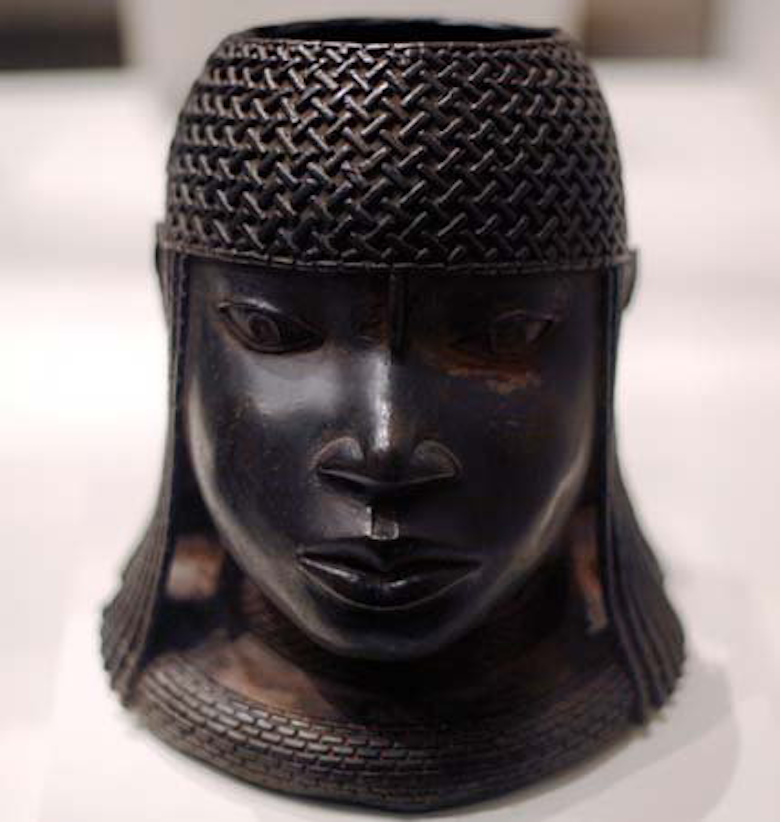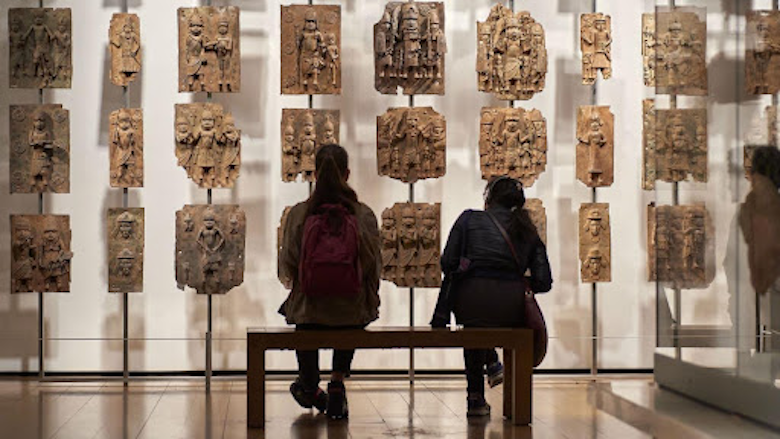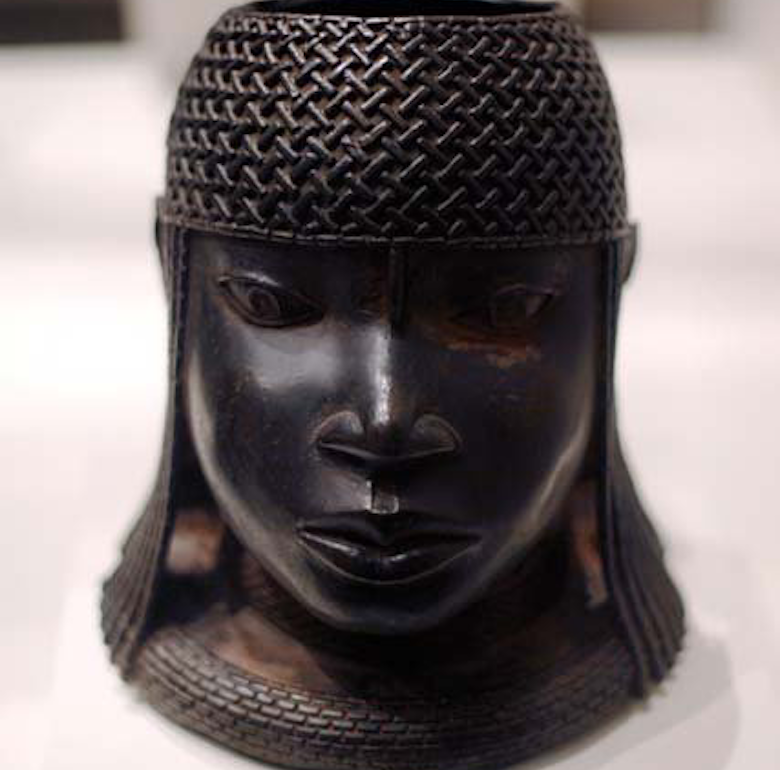Writer’s note: Why cling to stolen art? There is no moral justification for keeping stolen art. The descendants of the looters should not feel any more entitled to the art than the original owners. If some in the Western world feel dispossessed returning these artifacts, they should try to imagine how it must have felt for the original owners to have their art stolen.
When I was a child, my father would tell me stories of the deities in our village and their significance to our lives, even in our names. I was a city child, born and bred in Lagos Nigeria, occasionally, we’d travel over 600 km for 10 hours by road to our village in southeast Nigeria to spend Christmas with our relatives.
Our family name is Kalu Arunsi, it’s been passed down from son to son until it became a surname for younger sons to pass down to their children after colonialism brought Christianity to my village.
Kalu is a deity, a small deity as my father called it. Every family had a kalu. It was the family deity or chi, where families say daily prayers and expect it to watch over their affairs. It was an intimate relationship one had with their chi, when your chi was angry with you it showed in the ill fortunes of your house specifically, you can also be angry with your chi and it showed in the silent treatment and the abandonment of worship and attention you gave it.
It is different from the Arunsi which was the deity of the entire clan. If the Arunsi was angry, my father said, it affected the entire village, it shows in crop harvests, sick children, barrenness, wars and the likes. But my father never told me stories of real consequence from my village Arunsi. My father was a Christian. Raised and educated by the Presbyterian Church who visited our village at the time when twins were being abandoned in the evil forests to die as consequences of their birth. My father had four twin siblings and the church saved them. He remained a devout Presbyterian all his life.
Now imagine a day, sitting in your obi, children playing and women gossiping when some strangers pale as nzu (white clay) came into your compound and took your Arunsi because to them it was art, a conquest of battle, a concept you never considered in relation to your Arunsi.
Consider how rudderless you would feel, how the very essence of the village is torn from your clan, and how much you would be left wondering who you are and what becomes of you? If this is the end of all time for your people?
Now, generations later, ancestors gone, you are told by those in possession of your history, that they know how to care for your deity better than you can. They say it has become their history and they can give it relevance, having placed it in a box, better than you can. Who are you to know about yourself when they have the superior position of educating you about you. This is the infantilism behind the rationalism of stolen “art” which is in itself colonialism. It is supported by the argument that Africans cannot care for things and by keeping these cultural wonders in global institutions with the wealth to conserve them, they can be appreciated by a global audience.
The Benin Bronzes and Restitution: Stolen art is stolen heritage.
Now, let’s consider the Benin Bronzes. Artefacts made of brass, bronze and wood depicting the gods and kings of the Bini people, made lovingly to show reverence and pass on their traditions to their children’s children. When the palace was raided by the British 126 years ago, benin history, knowledge and religion was stolen leaving a proud people rudderless and their children without the history of their ancestors.

The Head of Oba (brass sculpture)- Britannica
The late Professor Folarin Shyllon, who spent his life advocating for return of the Benin bronzes, describes this better; “In 1897, a great tragedy befell the kingdom of Benin when a British punitive expedition looted the treasury of treasures in the royal palace and plundered artifacts including those of great spirituality to the Bini people. And although this is often glossed over or never mentioned, the so-called punitive expedition entailed “the death of untold numbers of its [Benin City] inhabitants”. The Oba Ovoramwen Nogbaisi was humiliated and sent into exile where he died.”
In December 2022, Germany returned 22 looted Benin bronzes to Nigeria. However, there was an outcry in Germany after news broke that the Nigerian government was handing over the artifacts to the Oba of Benin, a descendant of the king who reigned over the kingdom of Benin at the time the bronzes were looted in 1897. Although it was the British, not the Germans who plundered the Benin palace, about 500 artefacts are displayed in several German museums. But, the British Museum alone has more than 900 looted art.
Critics argued that this was a breach of agreement, as Germany promised to return 1,100 bronzes to be displayed in a museum being built in Edo state, Nigeria, the present location of the original homeland of the benin kingdom, where it would be fully accessible to the public.
According to European critics, it was not meant to be handed to a “private citizen”. The state of Saxony then paused further restitutions until they were clear on the consequences of the Oba’s ownership affecting the public display of the artefacts. But only a foreigner with no knowledge of African history will call an Oba a private citizen. The Oba’s palace has said the bronzes will be housed in the museum eventually. However, these protests confirm a colonial mindset that says “I will return your stolen birthright on the condition that I have unfettered access to it”. The offsprings of colonialists can not claim to reject the colonial past of their fathers but hang on to the mentality of colonialism when it suits them.



In an interview with German broadcaster, ZDF , the German Culture Minister Claudia Roth said she was “greatly bothered” by the reaction to the news in Germany. “There’s still so much that resonates that makes it clear that we haven’t really paid enough attention to colonial injustice.”
There are many arguments against returning stolen art. Some believe that the return of stolen objects is not enough and that more concrete measures, such as financial compensation, are needed to repair the economic and social damage caused by colonialism. Others argue that returning stolen art would be an acknowledgment of guilt for past injustices and would be unfair to modern Europeans who had no part in colonialism.
But what is true reparations in relation to stolen artefacts? For some, it is financial restitution. For many, it is the return of stolen art and the restoration of a stolen history.
Considering how much income rich countries have made from these artefacts, what would be the acceptable measure for satisfactory reparations, if any?
Financial Restitution vs. Cultural Exchange: A New Perspective on Looted Asset Recovery
Financial restitution is not the only answer to Africa’s looted asset recovery problem. In fact, getting money back, whether it is 1% or 100% of the value, may not be the best form of restitution. A different kind of restitution could bring greater value to Africa: access to cultural exchange.
Returning looted artefacts to Africa is not just about getting back what was stolen. It is also about gaining access to cultural exchange, which could bring greater value to Africa in the long run. An international diplomatic cultural exchange could be a form of restitution that would benefit both Africa and Europe.
If Europe returned looted artifacts to Nigeria, for example, it would attract European tourists to the country. This would boost Nigeria’s tourism industry and generate income for the country. It would also provide funding for Nigerian museums and facilitate exchanges in education, trade, language, and culture. Even if this development is limited to scholars and other professionals, such as archaeologists and curators, it would be a significant step forward.
Africa already faces limitations to access, including difficulty obtaining visas to travel to Europe and other parts of the world. This makes it difficult for Africans to participate in intellectual exchanges to teach people about their culture and traditions. As it stands, not many Africans can visit these countries to experience African art.
Returning looted artefacts to Africa would be a way to bring back to the continent what Europe has gained from it for centuries. However, this may not happen due to racial politics and the negative portrayal of Africa in the press.
In the context of cultural views towards artistic preservation, consider this: it is possible that for my forefathers, the Arunsi was not meant to be locked and preserved. Perhaps it would decay and be rebuilt by loving generations of worshippers to last longer than its previous form. Perhaps in rebuilding it with dedication and experience, it takes on a new form, not as refurbished art, but as a creature built from a shared destiny and loving devotion.
In short, Africa needs access, not money. Access to our heritage, access to knowledge, and access to opportunities. Returning looted artefacts to Africa is a way to achieve this. It is a way to right the wrongs of the past and build a better future for all.


